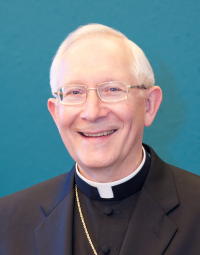
Archbishop Leonard P. Blair
In this season between All Souls Day in November and Christmas in December I’m prompted to write about something that relates to both. My immediate concern has to do with burial practices, but what is really at stake is our understanding of the human person created body and soul, and our belief in the resurrection, body and soul, on the last day.
What is the connection to this month’s celebration of Christmas? One of the church’s first theologians, Tertullian, once used a play on words in Latin to express one of Christianity’s most fundamental beliefs: caro salutis est cardo. Flesh (caro) is the hinge (cardo) on which salvation turns. In other words, the physical body of Jesus, born at Christmas, is the “hinge” on which the door of our salvation swings open. It was “in the body” that Jesus lived, died, was buried, and rose from the dead. These days we are witnessing a growing indifference towards the bodily remains of those who have died. “Remains” in-clude not only corpses but ashes as well. According to the Catechism, “the Church permits cremation, provided that it does not demonstrate a denial of faith in the resurrection of the body.” (n. 2301) Cremated remains are supposed to be given a proper burial in the ground or a columbarium and the same respect as a corpse. Yet I’m told that mortuaries are seeing more and more unclaimed ashes, and if they are interred, sometimes none of the family bothers to show up.
And then there are two new methods that have arisen for the disposition of bodily remains — alkaline hydrolysis and human composting. The former simply dissolves the greater part of the body and the remaining liquid is treated as waste-water. The latter yields a single mass of compost, with nothing distinguishably left of the body to be laid to rest in a sa-cred place.
Our U.S. Bishops’ Conference has point-ed out that these methods are not com-patible with our faith and that “we are obliged to respect our bodily existence throughout our lives and to respect the bodies of the deceased when their earthly lives have come to an end. The way that we treat the bodies of our beloved dead must always bear witness to our faith in and our hope for what God has promised.” If tragically a body is destroyed beyond any retrieval of remains, faith tells us that nothing is impossible for God.
And it is in the body that Jesus encounters us, especially in the Eucharist. During this year devoted to Eucharistic renewal we need to take to heart Christ’s words: “unless you eat of the flesh of the Son of Man and drink his blood, you cannot have life within you.” We are “in communion” with the risen Christ at Mass not just spiritually but bodily — his body and ours — in anticipation of our resurrection into eternal life. May we take to heart our duty to show prayerful respect to human remains and to preserve them in a way that gives wit-ness to our belief in the resurrection of the body.Caro salutis est cardo! Best wishes and blessings to everyone during the coming holy season when we celebrate “the Word made flesh.”
